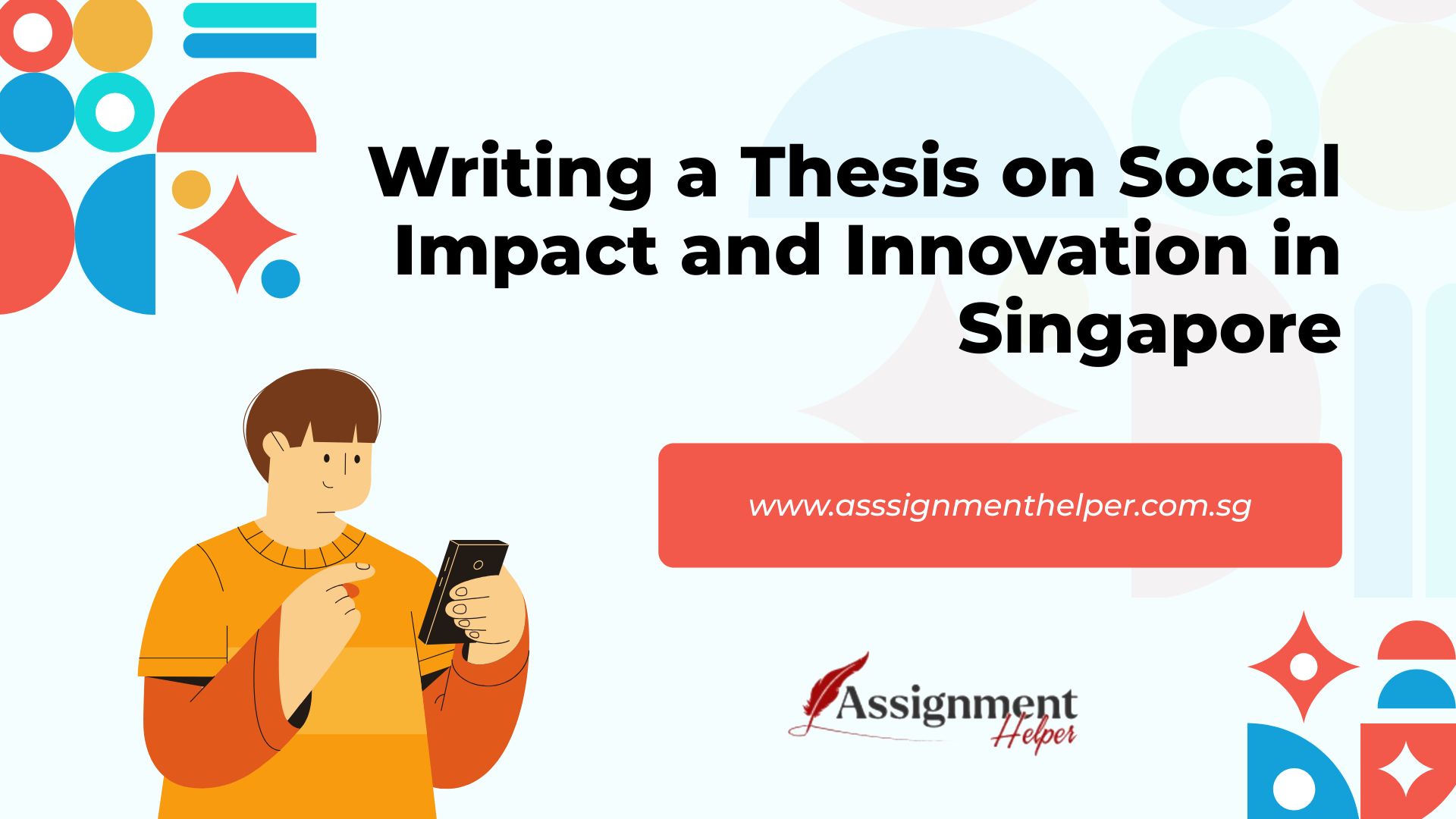Writing a Thesis on Social Impact and Innovation in Singapore

Sometimes, big changes are caused by small ideas. Many students wonder why food wastage is so high. Another asks how technology can help children learn better. And soon, these small questions grow into something bigger, like something that can change lives.
That’s what makes research in Singapore so special today. It’s not just about writing long papers or collecting data. It’s about using knowledge to make a real difference. Students are mixing creativity with care, and research with purpose.
When you walk into a university here, you can feel the energy of young thinkers who want to do more than pass exams. They have this desire to make their country kinder, smarter, and greener. And when ideas get too big or complex, they reach out for a professional writing service to shape those ideas into clear, strong research.
In this blog, we’ll explore how students in Singapore are turning their research into tools for social good and how the future of innovation begins.
The New Face of Research in Singapore
Something beautiful is happening in Singapore’s research world. Students are no longer writing just to pass exams, but they’re writing to make a difference.
More young minds want their work to mean something. They’re asking simple yet powerful questions, such as, “Will this help someone?” or “Can my idea make life better for others?”
Across campuses, you can feel the change. Students are choosing topics that touch real lives, from mental health and housing to sustainability and education. Professors also guide them in connecting theory to the real world.
Today, a thesis is not like a report, but it’s like a reflection of purpose and care. Students meet people, go out, collect stories, and turn these stories into data. It’s learning that feels alive.
Here’s how research focus has slowly changed over time in Singapore:
| Year | What Research Focused On | What It Looks Like Now |
| 2010 | Mostly theory and data | Focus on results and grades |
| 2015 | Innovation and startups | Tech-driven business studies |
| 2020 | Environmental awareness | Projects on green energy and waste control |
| 2025 | People and community | Work that supports equality and inclusion |
And when students need help shaping all these big ideas into clear words, many quietly reach out for thesis writing service support.
It’s not about taking shortcuts, but about ensuring their ideas shine as brightly as they deserve to.
Turning Ideas into Real Impact
Every great idea starts small. Maybe it’s a conversation with a friend. Maybe it’s something you saw on the street that made you think, “Someone should fix this.”
That’s how many research projects in Singapore begin, now with a moment of care. Students are not only collecting facts, but they are also trying to solve problems that are actually important to people.
Some are designing apps to help children learn faster. Others are studying ways to make workplaces kinder. A few are even exploring how art can serve as a form of healing.
What makes these projects powerful is their heart. They mix data with emotion, logic with empathy. That’s what social innovation truly means: creating ideas that positively impact lives.
Here’s a small glimpse of the kind of impact-driven projects happening today:
| Research Area | Real-Life Goal | Example Project |
| Education | Make learning fun for all | Gamified online classrooms |
| Environment | Build greener habits | Plastic-free community campaigns |
| Health | Improve wellbeing | Mental wellness support for students |
| Business | Support small enterprises | Fair-trade and local startups |
When the writing part begins, it’s not always easy. Explaining these ideas clearly can take time.
That is why students often opt for dissertation help not to make it simpler but to make it better.
This is because when your idea has meaning, it deserves to be written in the right way.
Why Social Impact Research Matters More Than Ever
If you talk to students of this era, you will notice something different. They are no longer chasing good grades. All they want is a work that means something. They want to fix things they see around them.
In Singapore, more and more students are choosing topics that help people. Some want to make learning easier for kids. Some are studying ways to support the elderly. Others are finding small ways to make cities greener or fairer.
It’s not about big words or long reports, but it’s about care. Teachers are glad to see this change. They say students ask deeper questions now, and questions that come from the heart, not just the textbook.
And universities are helping too. They give students the space to follow what truly matters to them. Slowly, this has turned into a quiet movement. Here is a small look at how it is growing:
- Growth of Social-Focused Research (2015–2025)
| Year | Projects About Social Change |
| 2015 | 18% |
| 2018 | 26% |
| 2021 | 38% |
| 2025 | 52% |

More than half of the new research work in Singapore now focuses on people and the community. That says a lot about this generation; they want to study, yes, but they also want to help.
The Future of Innovation and Research in Singapore
Research in Singapore is changing, but its heart stays the same, that is, people. Here’s how the next few years may look, in simple words.
- Technology Help Technology Will Help, Not Replace
AI tools will make research faster. Students can gather data or check results in minutes.
But the real ideas will still come from curious minds. Technology will guide, not take over.
- Projects Will Be More About People
Research will focus less on big theories and more on real stories. Students will go out, meet people, and solve local problems. For example, a health student might study better care for the elderly. A design student might create tools for small local businesses.
- Universities Will Support Real-World Ideas
Schools are now giving students more freedom to explore what matters to them. They’re creating labs and spaces where it’s okay to fail and try again. Some students even seek help from experts to refine their ideas and present them clearly.
- The Future Will Be About Balance
The next generation of researchers will mix heart and skill. They’ll use data but also empathy.
They’ll build smart things but also kind things.
- Where Research Is Heading (2025–2030)
| Focus Area | Direction |
| Social Innovation | Projects that help local communities |
| Sustainability | Studying energy, green living, and waste |
| Health & Wellness | Working on physical and emotional balance |
| Education | Innovative ways to learn and teach |
| Small Business Growth | Support for local entrepreneurs |
The future of research in Singapore won’t just be high-tech. It will be human at its core and built on curiosity, care, and the courage to do good things that matter.
The Real Heart behind Social Innovation
When you really sit down and think about it, innovation isn’t just about creating new things.
It’s about why you create them and who they help.
- In Singapore, we have seen students writing theses that go far beyond theory.
- They’re not just crunching numbers or quoting books.
- They’re talking to small business owners who are struggling.
- They’re visiting care homes to understand what community means.
- They’re building apps to make life easier for someone they’ve never even met.
And somewhere between their interviews and sleepless nights, they start to see that social impact isn’t something huge or distant. It starts in small, quiet moments. Like a student who helps a local seller learn digital payments. Or another who designs a simple recycling campaign for her neighborhood.
Frequently Asked Questions
- How to make research feel more alive?
You need to get out of your comfort zone. Go and talk to real people. Visit places that connect to your topic. Listen, observe, and feel. Your thesis becomes powerful when real voices echo through your pages.
- What if I just can’t get started?
Everyone hits that wall. Here’s a trick: forget about writing the “perfect” first line. Just tell the story of why you chose this topic. Once you are done writing this, the words will start flowing. Don’t do too much editing at the start, just write your thoughts on paper.
- How can I mix passion with academic writing?
It’s all about balance. Start with your heart and what made you care? Then, bring in your research to support the facts and numbers that lend strength to your story. It’s okay to sound human in your writing. Passion makes your work memorable.
- Any advice for students who are on the verge of giving up?
Take a breath. Step away for a moment. Then remind yourself why you started. Your words might help someone one day, and maybe someone who feels unheard or unseen. And that’s reason enough to finish strong.
It’s a Wrap
Writing a thesis of this type is not an easy task. Some days, you sit and stare at the screen, wondering if it makes sense. On some days, things fall into place and you feel proud of what you have accomplished.
The truth is, you learn a lot more than what’s written in your paper. You learn patience. You learn to handle stress. Additionally, you learn that caring about something can be both frustrating and meaningful.






